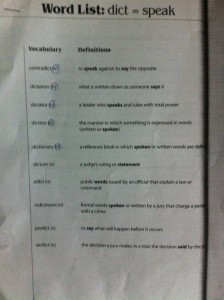Busy busy busy.
We started today with a lot of ‘housekeeping’ things. We changed our seats, talked about the field trip a bit, and finished up our points and tickets from the last week.
About half of the class seems to be getting the whole ‘volume’ thing. We did a lot of work with pop-cubes today, finding different rectangular prisms that have the same volume, and building prisms with given dimensions to find their volume. We finished up some notes as well:
Tonight students have some questions to answer. They are SURPRISINGLY similar to the notes that they took. They were advised to take their math journals home. They also have some volume questions to answer.
In Language Arts we seem to have some problems still with figurative language. It’s tough to think of the meaning behind idioms, similes, metaphors, hyperbole, and all of that good stuff. It’s a much higher level thinking skill than, say, simply answering a question about the names of characters or where a book took place.
We played Figurative Language Trashketball, and that was a lot of fun. Hopefully the students also have a bit of a better handle on hyperbole and personification.
Tonight students have a set of figurative language to identify. They should include why or how they know which type of figurative language each selection is using.
figurative-language-worksheet-02
Next we started looking at poems, and talking about their real meanings. It’s not always obvious, and sometimes the figurative language is a big part of it. Other times, there is a great deal of symbolism. We talked about and analyzed Robert Frost’s Nothing Gold Can Stay poem together. Tonight students should look at the first stanza of William Blake’s The Poison Tree, and write the first four lines in their own words:
I was angry with my friend;
I told my wrath, my wrath did end.
I was angry with my foe:
I told it not, my wrath did grow.
Finally, we had just enough time to crack open our science books and look at the chapter on forces a bit. Tonight students should define these 4 words in their science journals:
force
friction
magnetism
gravitation
so, tl;dr
volume questions and problems (look in your math journal!)
Identify the figurative language used (ALSO look in your language arts journal!)
figurative-language-worksheet-02
Write the first four lines of this poem in your own words:
The Poison Tree, by William Blake
I was angry with my friend;
I told my wrath, my wrath did end.
I was angry with my foe:
I told it not, my wrath did grow.
Define these words in your science journal:
force
friction
magnetism
gravitation
as always, read read read!
Have a good one,
Mr. Potter
